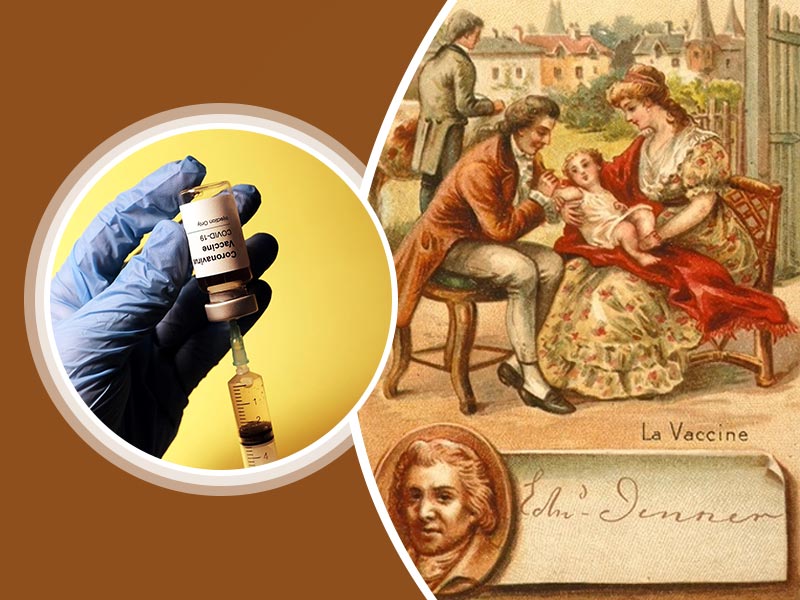
‘Vaccine’ was the most searched word of the year 2021, the Merriam-Webster dictionary said. ‘COVID vaccine’ was among the most searched terms on Google. Due to the coronavirus pandemic, vaccination has gained prominence in our day-to-day life. SARS-CoV-2, the deadly virus that causes COVID-19, could be controlled to some extent through vaccination. On December 8, 2020, the United Kingdom became the first country to start a vaccination programme against COVID-19. Although a few days behind, India, too, kick-started its immunisation drive this year on January 16. Over a billion vaccine doses were administered in the year, as per Health Ministry’s data, with millions fully-vaccinated against the viral disease.
Table of Content:-
Growing up, we all heard about vaccines for polio, influenza, tetanus, etc. But, do you know that the first vaccine to be ever developed was for smallpox? British physician Edward Jenner is credited with developing the world’s first vaccine in 1796. Three centuries since then, the field of vaccine research has made huge strides, with vaccines developed for multiple diseases. As there is an international call to get vaccinated for COVID, let us know why it is important by looking at the history of vaccination.
China In The 1500s

(Photo Credit: YouTube ScreenGrab/Onlymyhealth)
Before looking at Jenner’s phenomenal contribution to global health, let us go back a few centuries to 16th century China. The disease smallpox wreaked havoc then as it did a few century
ies later. Physicians in China developed a one-of-kind way to generate immunity. What they did was:
- Collect scabs from those infected with smallpox. These are the dry, rough coating that forms over a cut or a wound while healing.
- The powder was prepared by drying and grinding it.
- This powder was then inserted into people’s noses through a pipe.
- They found that the body was able to fight against the disease. When this process was introduced in Europe, it was called variolation, after ‘variola’, which is smallpox in Latin.
Also read: Covid Vaccines For 15-18, Boosters For 60+, Frontline Staff In January, Says PM Modi; Read Details
Edward Jenner Develops The World’s 1st Vaccine

(Photo Credit: YouTube ScreenGrab/Onlymyhealth)
In the 18th century, about four lakh people died of smallpox each year. Another disease, called cowpox, started spreading in Europe. It was similar to smallpox but much milder. It was widely known then that milkmaids who worked among cows contracted cowpox, and then got immunised to smallpox. Hence, Jenner gathered a group of his family and friends and inoculated them for cowpox. He called the process vaccination, based on the Latin word ‘vacca’, which means cow. Throughout the 19th and 20th centuries, Jenner’s vaccine was administered arm to arm.
Smallpox was a major public health issue then. The mortality rate was staggering as one in three died of the disease. The vaccine finally arrived in Bombay via Vienna, Baghdad, and Basra. On June 14, 1802, a woman named Anna Dusthall became the first person in India to be inoculated against smallpox. Almost two centuries later, in 1975, India registered its last case of smallpox. The World Health Organisation (WHO) declared the disease as eradicated in 1980.
Hence, you can see the role vaccine played in eradicating such a deadly disease from its roots. Not just that, vaccination has proved to be highly successful in controlling diseases such as polio, influenza, tetanus, chickenpox, measles, etc.
Also read: From Vaccine Rollout, 2nd Wave To Omicron Variant: How India's COVID Situation Panned Out In 2021
COVID Pandemic & Vaccines
Smallpox was a pandemic that the world won over. It’s now in the throes of another pandemic, caused by SARS-CoV-2, commonly known as the novel coronavirus. Countries the world over have started inoculating their masses. Effective vaccines are available. The need of the hour is to get vaccinated. It has become all the more important as the virus is mutating into highly contagious strains, such as the Omicron. Hence, get jabbed, and if eligible, get booster shots, too. As India is witnessing a steep rise in the daily COVID cases, follow COVID-appropriate behaviour. Hence, wear masks, practise social distancing, get jabbed, and pay attention to hygiene.
Photo Credit: Unsplash/YouTube Screengrab-Onlymyhealth
Also watch this video
How we keep this article up to date:
We work with experts and keep a close eye on the latest in health and wellness. Whenever there is a new research or helpful information, we update our articles with accurate and useful advice.
Current Version